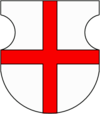Poetovia
| Ptuj | ||
|---|---|---|
| City | ||

The old part of Ptuj
|
||
|
||
| Coordinates: 46°25′10″N 15°52′10″E / 46.41944°N 15.86944°ECoordinates: 46°25′10″N 15°52′10″E / 46.41944°N 15.86944°E | ||
| Country |
|
|
| Traditional region | Styria | |
| Statistical region | Drava | |
| Municipality | Ptuj | |
| Government | ||
| • Mayor | Miran Senčar | |
| Area | ||
| • Total | 25.6 km2 (9.9 sq mi) | |
| Population (2013) | ||
| • Total | 17,972 | |
| • Density | 701/km2 (1,820/sq mi) | |
| Time zone | CET (UTC+01) | |
| • Summer (DST) | CEST (UTC+02) | |
| Climate | Cfb | |
| Website | Official site | |
Ptuj (pronounced [ˈptuːi̯] (![]() listen); German: Pettau; Latin: Poetovium/Poetovio) is a town in northeastern Slovenia that is the seat of the Municipality of Ptuj. Ptuj, the oldest recorded city in Slovenia, has been inhabited since the late Stone Age and developed from a Roman military fort. Ptuj was located at a strategically important crossing of the Drava River, along a prehistoric trade route between the Baltic Sea and the Adriatic. Traditionally the area was part of the Styria region and became part of the Austria-Hungarian Empire. In the early 20th century the majority of the residents were of German extraction, but today the population is largely Slovenes. Residents of Ptuj are known as Ptujčani.
listen); German: Pettau; Latin: Poetovium/Poetovio) is a town in northeastern Slovenia that is the seat of the Municipality of Ptuj. Ptuj, the oldest recorded city in Slovenia, has been inhabited since the late Stone Age and developed from a Roman military fort. Ptuj was located at a strategically important crossing of the Drava River, along a prehistoric trade route between the Baltic Sea and the Adriatic. Traditionally the area was part of the Styria region and became part of the Austria-Hungarian Empire. In the early 20th century the majority of the residents were of German extraction, but today the population is largely Slovenes. Residents of Ptuj are known as Ptujčani.
Ptuj is the oldest recorded town in Slovenia. There is evidence that the area was settled in the Stone Age. In the Late Iron Age it was settled by Celts.
By the 1st century BC, the settlement was controlled by Ancient Rome as part of the Pannonian province. In 69 AD, Vespasian was elected Roman Emperor by the Danubian legions in Ptuj, and the first written mention of the city of Ptuj is from the same year. Poetovium was the base-camp of Legio XIII Gemina where it had its legionary fortress or castrum. The name originated in the times of Emperor Trajan, who granted the settlement city status and named it Colonia Ulpia Traiana Poetovio in 103. The patristic writer Victorinus was Bishop of Poetovio before martyrdom in 303 or 304. The Caesar Constantinus Gallus was divested of his imperial robe and arrested in Poetovio before his subsequent execution in Pola (354) (Amm.Marc. Hist. XIV) The battle of Poetovio in 388 saw Theodosius I's victory over the usurper, Maximus.
...
Wikipedia


